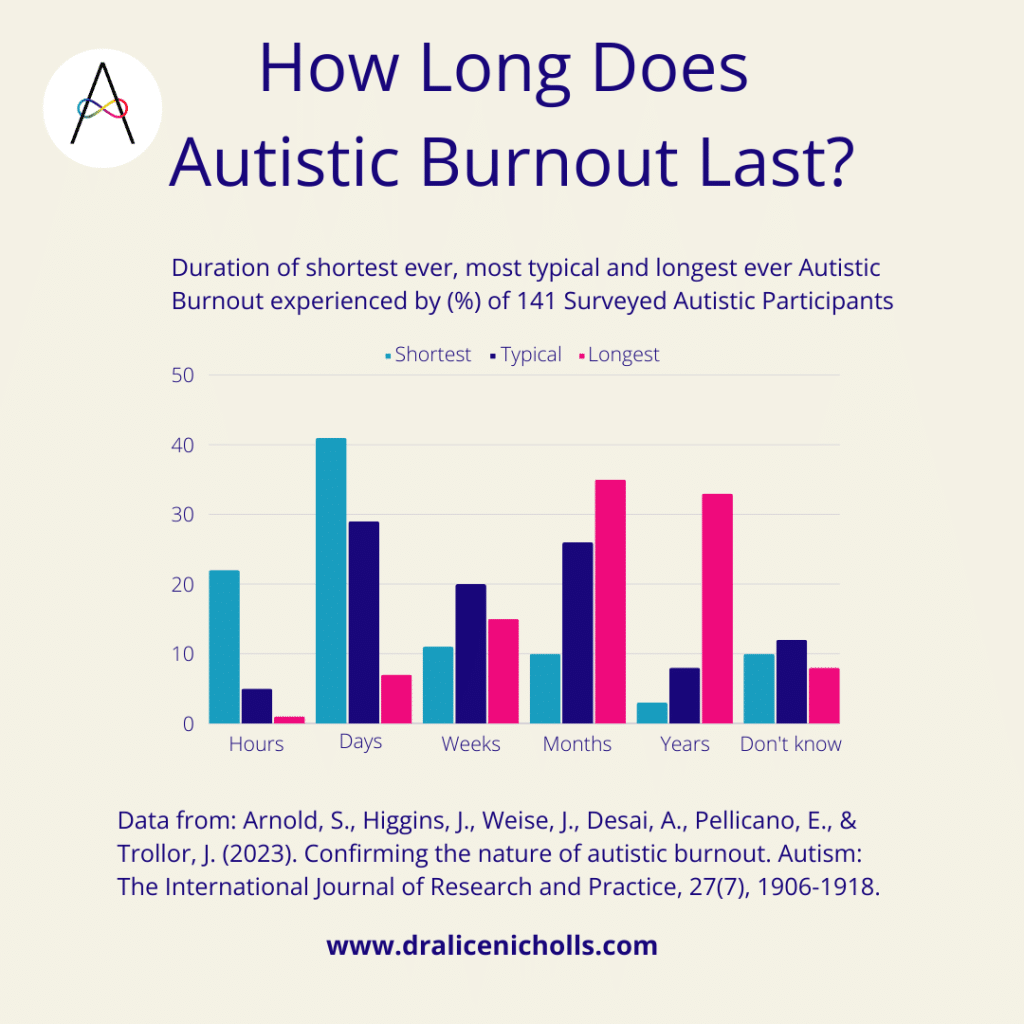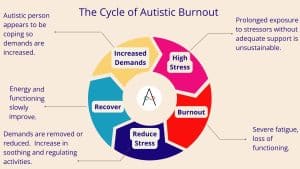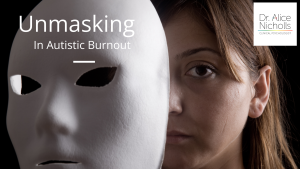Autistic Burnout can be a debilitating and frightening experience for Autistic people. If you are experiencing symptoms (see here for more on symptoms) you will understandably want to know how long it is going to last.
It would be helpful to predict how long recovery might take and when you can expect to regain important skills and roles within your life.
Unfortunately there is not a straightforward answer to this question. In this article I will cover:
- What the research tells us about how long Autistic Burnout lasts
- How you can use previous experiences of burnout to predict the length of this episode
- How the cause of your burnout may help predict how long it lasts
- How your recovery pathway can help predict how long it lasts
- Where you can find more information and support
What research findings tell us about the duration of Autistic Burnout
Research into Autistic Burnout is still in its infancy, but we are starting to see good use of the Autistic Community to inform researchers about the nature of Burnout.
Raymaker et al (2020) analysed data from 19 interviews and 19 public internet sources and found common themes. They concluded that Autistic Burnout was a pervasive, long term condition lasting three months or more.
Higgins et al (2021) worked with 23 Autistic adults to produce a definition of Autistic Burnout, within this work they reached no agreement in duration, with participants having mixed experiences of anything from a few hours to more than 5 years.
Arnold et al (2023) surveyed 141 Autistic adults who self-reported previous experience of Autistic Burnout. They were unable to find a consistent agreement on length of burnout, with 22 % of participants saying their shortest burnout lasted a matter of hours and 33% saying their longest lasted years. They suggest that both brief and lengthy episodes are possible and found that some participants also distinguished between an acute episode or phase and a longer term episode or chronic phase. I have summarised the data presented in Arnold et al’’s paper to produce figure 1.

The figure presented above shows the percentage of participants in the Arnold et al reporting each length of burnout for their shortest, most frequent, and longest episodes of Autistic Burnout. There is a lack of consensus on how long a typical Autistic Burnout lasts. Arguably, very short periods of burnout could be conceptualised as shut downs and the researchers point out there is a lack of clarity of where one ends and the other begins.
How your previous experiences can help predict the length of your Autistic Burnout
If you have a consistent pattern of Autistic Burnout, and you do not think things have become significantly different in your life, you may be able to predict how long this current period will last.
41% of people in Arnold et al’s study reported that their periods of burnout had become shorter over time, while 11% said they had stayed the same and 41% said they were increasing in length. When interviewed, participants who reported an increase in length of burnout associated it with an increase in demands on them, the aging process and a decrease in their ability to cope over time. People who reported a decrease talked about how their increased understanding of their needs and their burnout pattern had enabled them to recover from Autistic Burnout faster and avoid, or lessen the impact of Autistic Burnout by taking action to remove stressors or engage in soothing, regulating activity before they reached crisis point.
Try asking yourself the following questions:
- What is my usual pattern of Burnout?
- Is my life significantly different now?
- Are there increased demands on me?
- Do I have a better understanding of my needs?
- Do I have more coping strategies or support now?
How the Cause of Your Autistic Burnout Can Help Predict the Length of it
Sometimes, even when life is generally feeling quite sustainable, big things happen that cause us high levels of stress, such as a bereavement, illness, trauma, moving house, getting married, having a baby, sitting exams. These events can trigger an Autistic Burnout, but if the issue resolves (e.g. you’ve finished your exams) you may find that the burnout resolves relatively quickly.
If the build up was more insidious, or so slow you didn’t even notice it was happening, then it can take a long time to work out why the Autistic Burnout happened. It can also mean that life, as you were living it, was unsustainable for you in the long term. You may need to make significant changes to your lifestyle to make it more manageable, this can be tricky to work through at the best of times, but even harder when you are in Autistic Burnout.
Try asking yourself the following questions:
- Did I notice I was going into Autistic Burnout?
- What was going on in my life when it happened?
- Was it a slow build up of multiple stressors?
- Was it a single highly stressful incident?
- Or a combination of a slow build and a bigger trigger?
- Have those stressors gone away?
The Role of your Recovery Pathway in Predicting Length of Autistic Burnout
Sometimes when Autistic Burnout happens we have a good sense of what we need and are able to access it over time. For example after final exams you might have booked some time off to rest and engage in soothing and regulating activities.
Unfortunately sometimes we know what we need but it is hard to access it, this can be for various reasons, often shame or self criticism, financial constraints, lack of practical support and caring responsibilities. These can be barriers to rest and engaging in soothing, regulating and replenishing activities.
If you are not sure what you need to help soothe and regulate yourself or to make life more sustainable in the long term, recovery is likely to be slower. You may need more time to figure out what helps and what makes your burnout worse.
Try asking yourself the following questions:
- Do I know what I need to recover from Autistic Burnout?
- Is my normal lifestyle sustainable for me?
- Do I have enough access to support and resources?
- Will I allow myself to do what I need to do?
Information and Support
If you would like help to figure out what you need in order to recover from Autistic Burnout you might find this article helpful. You might also find it useful to join my Autistic Burnout Recovery Membership, Coaching programme or take my online course. Although there is currently very little research in this area, there are also lots of Autistic Advocates and coaches, facebook and twitter communities who are experienced in helping each other with Autistic Burnout, please know you are not alone in your experience and there are other people out there who can help.











